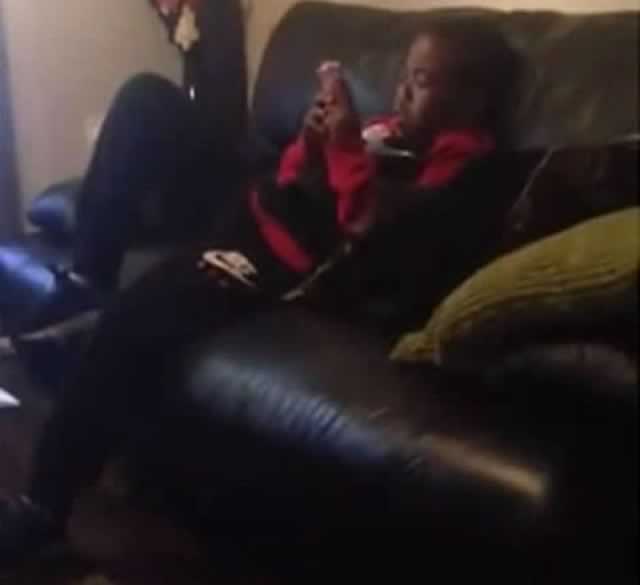The lost Diaspora child


A scene captured from the video clip showing a spoilt Zimbabwean child that has gone viral on WhatsApp
Sekai Nzenza on Wednesday
Gone are the days when we lived in the village and any adult could discipline us. When we were growing up in the village, my mother hardly ever used the stick on us.
There is a video going around on WhatsApp. In the short video, the boy is leaning back on the sofa with his eyes focused on the video game.
You can see a quarter of the TV screen and images darting back and forth. There are some colourful pink cushions on the brown leather sofa and a couple more pink ones are lying on the fluffy brown carpet. Behind the sofa are plastic-like roses.
The boy, who seems to be about 11 or 12, is wearing heavy solid boots and two T-shirts under a black jacket. Voices of two women can be heard above the TV sounds.
Although you do not see the faces of two women sitting opposite the boy, you can see one woman’s well-painted bare feet crossed over at the ankles and resting on the carpet.
Then you suddenly hear the raised voices of three people in conversation competing with the blurring television.
From the conversation of English and Shona, you quickly gather that the three people include an angry boy from Zimbabwe, his mother and this aunt who is visiting.
This could be London, Birmingham or Sheffield. Either way, we are aware it must be in the UK because the boy is speaking with a British accent.
The aunt’s soft voice says something to the boy. He looks at both his mother and aunt and explodes in anger.
Apart from swear words that start with an f . . . and others with b . . ., you cannot understand anything because the boy is screaming and shouting at his mother and aunt.
Then you hear the aunt saying in Shona accent, “I am your aunt. You have my blood in you. Even if you try to be someone else, you will not be, because you are an African.”
The boy’s angry eyes move from the video game back to the mother and aunt and he screams that he does not have an aunt.
Then he says something about Africa and Ebola. The aunt says there is no Ebola in Zimbabwe.
Speaking only in Shona, the mother and aunt talk about how the boy was outside before and they called him back into the house.
“Since he has been back, look at how he is behaving now,” says one of them with a deep slow tone of regret or maybe sadness. But the boy does not want to be reminded that he was outside before.
He shouts, rants and screams calling them names starting with a b and an i.
Then the mother or the aunt says they should eat, “Ngatidye sadza now and we can stop listening to this nonsense.”
Then the video stops.
I sent the video to my cousin Piri because she is on WhatsApp now.
“Mwana waani iyeye anoshura mare kudaro?” she asked, meaning, whose kid does rude miracles like that? I said I have no idea. This was reality television captured on camera. “That is a real kid?” she asked. I said yes.
“So why do the parents think they can eat sadza when a child is descending into hell like that?
“What are those women doing in London bringing up a monster like that? Do not blame the child. Why don’t they take a big stick and beat him really hard and he will learn not to talk to adults that way?” Piri asked.
“You cannot do that in London or anywhere else. That is called child abuse,” I tell her.
I told Piri that one time a Zimbabwean teenager was so bad in New York.
When his father belted him the way it used to happen back in the village, the 12-year old boy picked up the phone and dialled the police.
The police came and arrested the father for violence against a child.
Since the father was due to return to Zimbabwe anytime, he managed to convince the authorities that the boy will be safe back home in Zimbabwe and he would not be beaten again.
The American authorities decided that the boy could only be safe if accompanied by a social worker to Harare.
The social worker flew all the way from New York, boy in tow, and delivered him to social workers at Harare airport. As soon as the American social worker went back, the father asked for his boy from the social workers.
When the boy got home, his grandmother twisted his ears so hard and asked him to promise never to misbehave like a spoilt American kid again.
I forwarded the same phone video to my cousin Reuben in Australia, who is battling discipline issues with his son Tinashe.
After watching it, Reuben called and he was laughing his head off.
“What is so funny about a kid behaving like that, calling his mother a b . . . ?” I asked him. Reuben said that kid in London makes his son Tinashe look like an angel.
“Although it was not funny, sometimes you laugh at your problems to ease the pain of being a father,” he said.
Then he went on to tell me the story about Nigerian parents in London. I had heard it before but I listened.
In a supermarket in London, an African woman and her 10-year-old daughter stand at the checkout with their trolley of groceries. In front of them is an English mother and her daughter of about the same age as the African child.
The English child takes a bar of chocolate from a shelf nearby. Her mother grabs the chocolate from her and says, “No, darling. You will not have another chocolate. There is one in the trolley already.”
The daughter sticks her tongue out at her mother in defiance. Then she dashes off and brings an even bigger packet of chocolate. She puts it under her armpit and stands back with her arms tightly folded. The mother lowers her voice and in slow measured tones she says, “Sophie, listen to me. I said you cannot have another packet of chocolate. One is enough.”
They wrestle a bit and the mother grabs the chocolate packet from Sophie’s armpit and puts it back on the shelf.
“You are mean! Mean, mean! I hate you Mum. I hate you!” Sophie screams and shrieks. People in the supermarket smile at each other with embarrassment.
“The African mother, standing behind, nudges her daughter and speaking in a strong Nigerian accent in English, she whispers into the child’s ear: “Efi, listen, Efi. If I ever, ever see you behaving like that English child, I will kill you.” Efi nods quietly in obedience.
Back home, when Efi’s father comes back from his night shift job as a hospital cleaner in the early hours of the morning, Efi’s mother tells him about the incident in the supermarket.
The father listens, and then he quickly goes to Efi’s room. He pulls her blankets back and she wakes up slowly. Efi’s father says, “Efi, listen. Your mother has told me about the bad behaviour of the English child in the supermarket. If I ever, ever see you behave like that English child, I will kill you before your mother does. You hear me?” Still half asleep, Efi nods. Then the father slaps her hard on the shoulder. “That was just a deposit to give you a taste of what I can do to you if you misbehave like that.” The father said and stormed out, believing that his long-term “deposit” is well and truly stored in Efi’s aching shoulders.
Reuben could not stop laughing when telling me the story.
“Ah, yaa, how does one discipline children in the diaspora cross culturally and in different settings?” he asked.
Gone are the days when we lived in the village and any adult could discipline us. When we were growing up in the village, my mother hardly ever used the stick on us.
My mother had a certain presence about her that spoke volumes. If you did something wrong, she would give you a certain look, then simply say, hatidaro, we do not do that. And that was enough. Those words were bigger than the stick.
“That kid in London is having it tough,” said Reuben.
“What can be done to help him and the parents as well?”
When I asked Piri the same question, she said, “Bring the kid home, send him to a school called St Nyoka in Buhera until he finishes high school. That is the only way to cure that lost boy.”
Dr Sekai Nzenza is an independent writer and cultural critic.







Comments